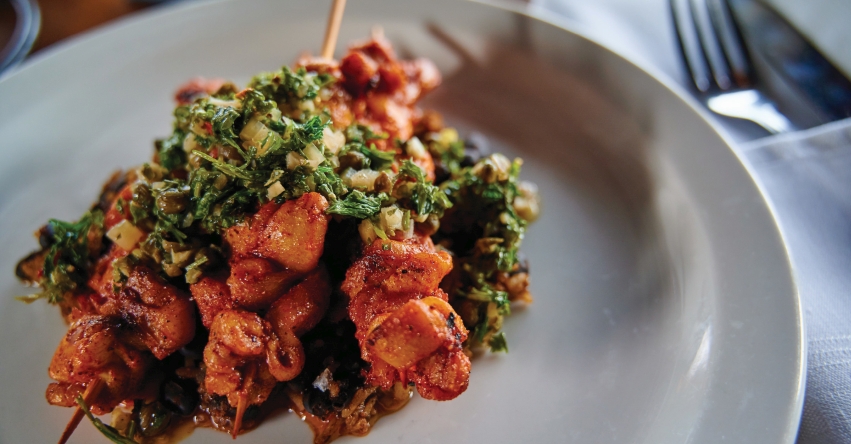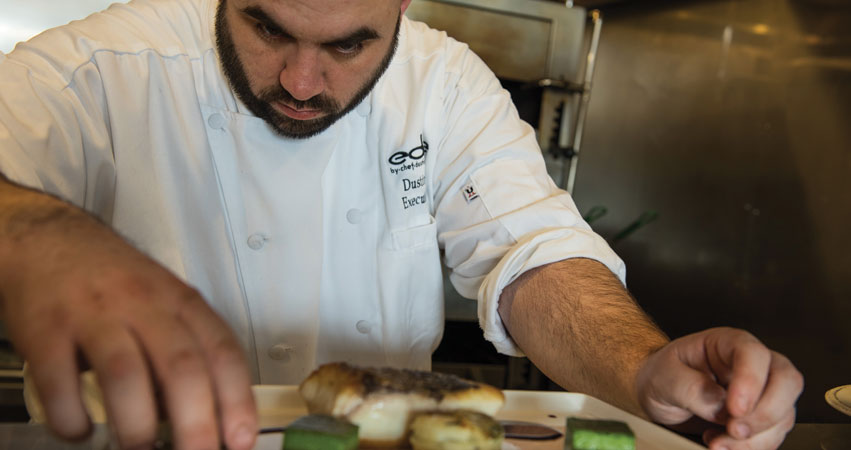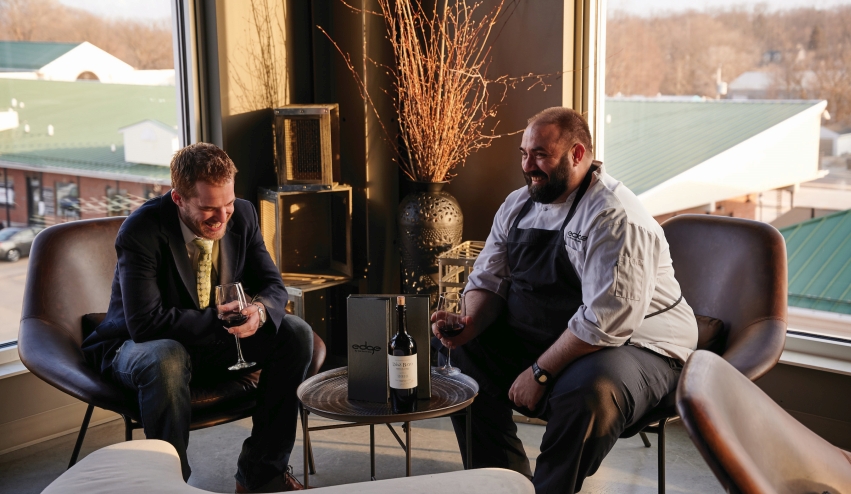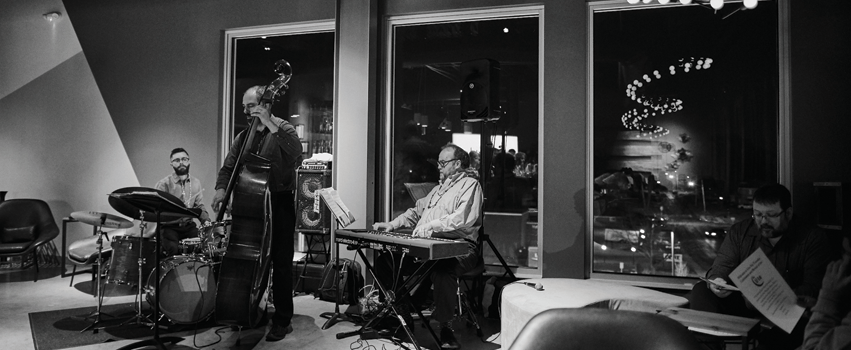
“Locally Sourced + Artfully Elevated.” Since opening Edge in 2013, Chef Dustin Allen has strived to live up to that ambitious tagline as a mainstay on Peoria’s culinary scene. Growing up with food as the center of community, Allen unites his early influences and studies of great chefs with a passion for local family farms to create a dining experience unlike any other in the region. By building close relationships with local growers, he’s creating flavors unique to the Midwest—and winning awards in the process. Allen sat down with Peoria Magazine to discuss his culinary roots and philosophy, his ties to local farmers, plans for the future, and much more.
Please give us some background on your family and childhood. What led you to Peoria?
I was born in Pike County, Illinois, to a blue-collar family of entrepreneurs. My mother’s family owned a water and oil well drilling business, and my father’s side were restaurant owners. Growing up, I attended several schools throughout Illinois and Virginia.
A combination of life’s twists and turns led Ashley and me to Peoria. We had been traveling to OSF Children’s Hospital since early 2006, when our middle son was born with bilateral cleft lip and palate—and subsequently our daughter in 2009—so we wanted to be closer to our kids’ medical teams and doctor visits. In late 2009, I had the opportunity to help transition the old Butcher Block to Magnolia’s Steakhouse, and I was with that project until early 2013. Ashley and I spent some time talking and decided the Peoria area had become our adopted home. Our children were established and thriving in their schools, we had met a lot of wonderful people, and from a business standpoint, Peoria and the surrounding area has supported us. In late 2013, we opened Edge with the philosophy of sourcing all our products from local family farms—with no national suppliers in our supply chain.
When did you first know you wanted to be a chef?
I wanted to work in a kitchen and cook for others well before I knew what a chef was. Growing up, as in many small, rural communities, food was an integral part of life that was at the center of all events as a family. There’s something special about food, family and community—coming together around a table to enjoy the company of friends and loved ones. I enjoyed watching the reaction of people enjoying a meal. As I got around the age of nine or 10, my mother tells stories of how I would cook meals for our family out of necessity, as she was a single mother working to support and raise two kids. I also remember the hustle and bustle of my grandparents’ diner, and watching everyone cooking together to feed upwards of 300 people on a Sunday morning after church services. Something about the sights, sounds and smells has stuck with me since I was “knee high to a bullfrog.” To this day, I love every moment of those experiences.
Tell us about your culinary training. Who were some of your early influences?
My earliest influences were my grandparents. Both of my grandmothers and Grandpa Allen were great cooks. They influenced my love for comfort foods and home cooking—always cooking from scratch with real ingredients. That is probably why I don’t believe in cooking with processed ingredients or premade foods—that just wasn’t the way Grandma did it!
At the age of 16, I had the opportunity to work for a chef who had cooked in Europe; learning from him about fine dining led me down the path of wanting to pursue cooking in an elevated style. I began studying the best chefs in the world, trying to understand their philosophy of cooking and service. Chef Charlie Trotter and Chef Thomas Keller become my favorite chefs to study and understand their thought process and pursuit of perfection. While studying Chef Charlie Trotter, I became driven to understand the pairing of wine and food. Today, those same philosophies drive my commitment to wine and food pairings on our menu.

In my early 20s, I spent a lot of time traveling the U.S., eating in small, family places much like I grew up in. Just as my grandparents did in cooking the flavors of the Midwest, these families were cooking the flavors of their culture and communities. After dining in these small family restaurants, it always left me wanting to learn and experience more about the food and history of that area’s culture. In doing so, I began to create a palette of unique flavors, spices and techniques, passed down through many generations—that many people shared with me and I still use today in our cooking.
What is your “philosophy” of food?
“Sustainable” is the one word that describes my philosophy of food. I wanted to create a restaurant that would help sustain the small American family farm and provide an outlet for them to produce products other than corn and soybeans. I wanted to work with ingredients that were raised and grown with sustainable farming practices that could be passed on for generations, without causing damage to the fertile lands we are fortunate to have. I wanted to help sustain and give back to our local community through purchasing of meats and produce from a network of local growers. In return, they spend locally in the community, and as a group we continue to support each other. Every year since 2013, Edge has committed nearly $100,000 to local growers in purchasing their products.
Tell us about those ties to local farmers. How do you reach out and connect with them?
The idea of operating a restaurant based solely on sustainable ingredients sourced locally runs so much deeper and personally for me than the buzzword of “farm-to-table.” As I became a chef, I knew I wanted to give back to the local farming communities that helped shape me as a young kid. I wanted to help give them a chance to stay on their family farms and create a market for them to sell meats, produce and grains at a fair market price. My goal was to be able to help one family farm. Little did I know when I started that today our network of farmers and growers would consist of 60+ families, all within 80 miles of Peoria.
In late 2012, I read an article about Spence Farm in Livingston County. Knowing the philosophy and direction for Edge, I took a chance and reached out to Marty Travis of Spence Farm and spent time with him and his son Will. That relationship has led to our vast network of family farms in 2019. Marty and Will have created a very successful model for getting product from the farmers to the chef, from ordering all the way through delivery. The most important factor in making our system work has been the building of friendships and trust between myself and the farmers. All throughout the year, we have great conversations on how we can help each other, or sharing ideas and feedback on new produce and meats.

“Local” has also become a buzzword, both in the culinary world and beyond. How do you differentiate yourself and stay true to your principles?
We are very fortunate in the Midwest to have great farmers who are the backbone of much of our region. I agree that “local” and “farm-to-table” have been overused and misused to the point of being generic. I tend to leave these words out when describing Edge and my style of cooking. “Whole farm cooking” is the best way to describe our style—and being committed to using everything the farm has available. I have conversations with the farms weekly to know what they have available and what looks best in season. This allows us the creative freedom to rewrite our menus daily and provide the best ingredients available to our guests. I am a firm believer that we don't have to shout over the rooftops that we use all-local ingredients. You can truly taste the difference of “local” in our menu. It is the only way I believe it should be done, and for me that is our driving force.
On your website, you describe global cooking as “studying techniques from generations before us and implementing them into local ingredients to create a melting pot of global flavors.” Can you give an example of how you do this?
I’ve spent the better part of the last 15 years studying food and cooking techniques from around the globe. In doing so, you begin to understand how culture, region, climate and growing patterns sculpt the foods that define a region and the cooking techniques used to create their flavors. These techniques may be how they make bread or pasta, how they would braise meats or pickle produce, etc. One of the oldest techniques we are using is our authentic handmade pasta, using many of the same tools they have used for generations. We hand-roll each of our pastas at the time our guests order, and all of our pasta doughs are made using Spence Farms’ WTF pasta flour, which is a blend of three varieties of wheat they grow: Warthog, Turkey Red and Red Fife. That creates a pasta with a lot of depth, and we pair all of our pasta with ingredients from local farms—making chorizo from pasture-raised pigs, Bolognese with local tomatoes and local beef, and smoked bacon in place of the traditional pancetta.

You have also described your food as “peasant food.” What does that mean to you?
I’ve always been drawn toward the depth of flavor in peasant dishes. I admire the ability to take ingredients no one else wanted to create dishes with depth and complexity, and to utilize everything available without wasting anything. These are the same principles by which I run my kitchen. Steak, lobster, caviar, foie gras, etc. are all great ingredients on their own; they should taste really good without a skilled cook who understands the technique and foundation of cooking. Give the same cook that skill and understanding and ask them to take ingredients such as short ribs, hanger steaks, shoulders, duck, dried legumes… and they will create a meal and experience you will always remember. I love taking the simplest of ingredients and maximizing the flavors, or being able to take a whole animal and break it down and create dishes that create that experience for you.
Congratulations on winning the 2019 Wine Spectator Award of Excellence! Can you tell us about the award and its significance?
First of all, thank you. This was a five-year plan I set out to achieve. Wine became very important to me over the last eight to 10 years, as I began to understand really good wine. The first time I tried a true French Burgundy, it totally changed my view of what great wine was, and how it was made to complement the food of the region where it was produced. I am driven by the magic that happens when a dish complements a bottle of wine perfectly.
It was a huge honor. To be included in a list of the best wine programs in the world—less than 3,800 of them—is amazing. This is a huge achievement, and not only for Edge. It’s another way to showcase the Peoria region and the quality we have to offer on an international level. Our current wine program has 175 different wines from all over the globe. It is designed to be approachable for everyone and adventurous enough to pique your interest. I love showcasing wines from small producers who put their heart and soul into each bottle.


Tell us about your vision for The Twelve Bar and how it complements the restaurant.
The Twelve Bar, located on the third floor above Edge, is a really cool space designed as a lounge, with a modern industrial vibe, floor-to-ceiling windows, and music always playing, ranging from jazz and blues to modern R&B and everything in between. It’s a place you can come and relax with your friends, enjoying a craft cocktail or a bottle of wine with small plates, cheeses and charcuterie. We host live music every Wednesday and Friday evenings, and each month is highlighted by our original “Songs & Stories” series, featuring some of the most talented singer/songwriters in the Midwest.
Can you tell us about any future plans you may have?
The future is busy looking ahead. We will be launching a full-service, onsite catering operation for weddings, business meetings, outdoor parties and cookouts, along with in-home catering—all following the same philosophy that has made Edge successful. Our other big thing coming up will be the opening of the outdoor rooftop patio just off The Twelve Bar in the spring of 2020. This will be an amazing, relaxing atmosphere with small plates, wine, cocktails and music. PM
- Log in to post comments

